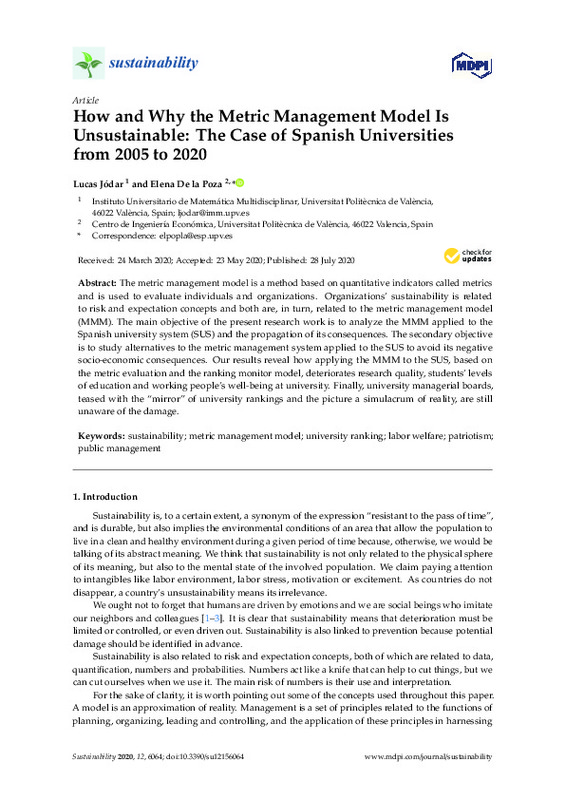Tsvetkova, E., & Lomer, S. (2019). Academic excellence as «competitiveness enhancement» in Russian higher education. International Journal of Comparative Education and Development, 21(2), 127-144. doi:10.1108/ijced-08-2018-0029
Hazelkorn, E. (Ed.). (2016). Global Rankings and the Geopolitics of Higher Education. doi:10.4324/9781315738550
Pietrucha, J. (2017). Country-specific determinants of world university rankings. Scientometrics, 114(3), 1129-1139. doi:10.1007/s11192-017-2634-1
[+]
Tsvetkova, E., & Lomer, S. (2019). Academic excellence as «competitiveness enhancement» in Russian higher education. International Journal of Comparative Education and Development, 21(2), 127-144. doi:10.1108/ijced-08-2018-0029
Hazelkorn, E. (Ed.). (2016). Global Rankings and the Geopolitics of Higher Education. doi:10.4324/9781315738550
Pietrucha, J. (2017). Country-specific determinants of world university rankings. Scientometrics, 114(3), 1129-1139. doi:10.1007/s11192-017-2634-1
Olcay, G. A., & Bulu, M. (2017). Is measuring the knowledge creation of universities possible?: A review of university rankings. Technological Forecasting and Social Change, 123, 153-160. doi:10.1016/j.techfore.2016.03.029
Casani, F., De Filippo, D., Garcia-Zorita, C., & Sanz-Casado, E. (2013). Public versus private universities: Assessment of research performance; case study of the Spanish university system. Research Evaluation, 23(1), 48-61. doi:10.1093/reseval/rvt028
De la Torre, E. M., Gómez-Sancho, J.-M., & Perez-Esparrells, C. (2017). Comparing university performance by legal status: a Malmquist-type index approach for the case of the Spanish higher education system. Tertiary Education and Management, 23(3), 206-221. doi:10.1080/13583883.2017.1296966
Levy, D. C. (2018). Global private higher education: an empirical profile of its size and geographical shape. Higher Education, 76(4), 701-715. doi:10.1007/s10734-018-0233-6
Las Cifras de la Universidad Pública y la Universidad Privada en España: 1983–2016https://www.universidadsi.es/las-cifras-la-universidad-publica-la-universidad-privada-espana-1983-2016/
Merry, S. E. (2011). Measuring the World. Current Anthropology, 52(S3), S83-S95. doi:10.1086/657241
Fire, M., & Guestrin, C. (2019). Over-optimization of academic publishing metrics: observing Goodhart’s Law in action. GigaScience, 8(6). doi:10.1093/gigascience/giz053
Biagioli, M. (2016). Watch out for cheats in citation game. Nature, 535(7611), 201-201. doi:10.1038/535201a
Fanelli, D. (2009). How Many Scientists Fabricate and Falsify Research? A Systematic Review and Meta-Analysis of Survey Data. PLoS ONE, 4(5), e5738. doi:10.1371/journal.pone.0005738
Raafat, R. M., Chater, N., & Frith, C. (2009). Herding in humans. Trends in Cognitive Sciences, 13(10), 420-428. doi:10.1016/j.tics.2009.08.002
Goyanes, M., & Rodríguez-Gómez, E.-F. (2018). ¿Por qué publicamos? Prevalencia, motivaciones y consecuencias de publicar o perecer. El Profesional de la Información, 27(3), 548. doi:10.3145/epi.2018.may.08
Burke-Smalley, L. A., Rau, B. L., Neely, A. R., & Evans, W. R. (2017). Factors perpetuating the research-teaching gap in management: A review and propositions. The International Journal of Management Education, 15(3), 501-512. doi:10.1016/j.ijme.2017.08.004
Van Dalen, H. P., & Henkens, K. (2012). Intended and unintended consequences of a publish‐or‐perish culture: A worldwide survey. Journal of the American Society for Information Science and Technology, 63(7), 1282-1293. doi:10.1002/asi.22636
Barómetro Juvenil de Vida y Salud 2017, Fundación Reina Sofia sobre Adolescencia y Juventud, Fundación de Ayuda a La Drogadicciónhttp://www.proyectoscopio.es/barometro/barometro-juvenil-de-vida-y-salud-2017
Bell, A. S., Rajendran, D., & Theiler, S. (2012). Job stress, wellbeing, work-life balance and work-life conflict among Australian academics. E-Journal of Applied Psychology, 8(1). doi:10.7790/ejap.v8i1.320
Abramo, G., Cicero, T., & D’Angelo, C. A. (2011). The dangers of performance-based research funding in non-competitive higher education systems. Scientometrics, 87(3), 641-654. doi:10.1007/s11192-011-0355-4
McIntosh, S., McKinley, J., Milligan, L. O., & Mikolajewska, A. (2019). Issues of (in)visibility and compromise in academic work in UK universities. Studies in Higher Education, 1-12. doi:10.1080/03075079.2019.1637846
Dearden, J. A., Grewal, R., & Lilien, G. L. (2019). Strategic Manipulation of University Rankings, the Prestige Effect, and Student University Choice. Journal of Marketing Research, 56(4), 691-707. doi:10.1177/0022243719831258
Carson, L., Bartneck, C., & Voges, K. (2013). Over-Competitiveness in Academia: A Literature Review. Disruptive Science and Technology, 1(4), 183-190. doi:10.1089/dst.2013.0013
Kallio, K.-M., Kallio, T. J., Tienari, J., & Hyvönen, T. (2015). Ethos at stake: Performance management and academic work in universities. Human Relations, 69(3), 685-709. doi:10.1177/0018726715596802
Albert, C., Davia, M. A., & Legazpe, N. (2015). Determinants of Research Productivity in Spanish Academia. European Journal of Education, 51(4), 535-549. doi:10.1111/ejed.12142
Lee, I. (2012). Publish or perish: The myth and reality of academic publishing. Language Teaching, 47(2), 250-261. doi:10.1017/s0261444811000504
Wessels, J. S. (2015). The human spirit as a necessary condition for higher education: a risk assessment. The Journal for Transdisciplinary Research in Southern Africa, 11(2). doi:10.4102/td.v11i2.75
[-]









